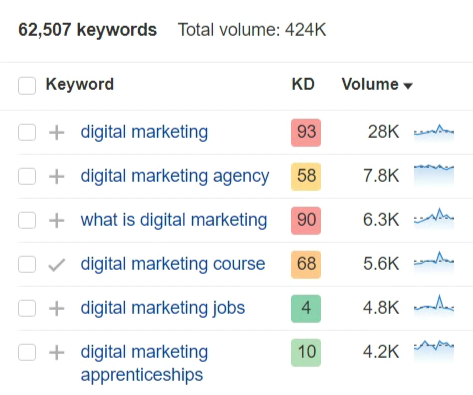

Maximising Visibility: A Guide to Short-Tail Keyword Mastery
Written By Otilia Crizbasan | 22 November, 2023
The broad topics that attract large audiences and fierce competition
Choosing the right keywords is a vital step in any search search strategy. When done right, it plays a significant role in building your brand’s success in search.
Short-tail keywords are no exception. If you’re in marketing or running your own gig, getting the lowdown on these terms is a game-changer for making waves online.
Get ready to understand short-tail keywords — what they are, their importance and how to leverage them effectively to make your business stand out.
What are short-tail keywords?
According to Ahref, short-tail keywords, also known as head terms, are “search queries that refer to very broad topics and have high search volumes.” They are much less specific than their counterparts, the long-tail keywords.
Targeting head terms comes with a catch. Because they are so general, the people who visit your site might not find exactly what they’re looking for. This can lead to them leaving quickly (also known as a high bounce rate), and they might only buy something if your product or service is exactly what they were searching for.
A high bounce rate could suggest to the search engines that your website’s content isn’t high-quality or relevant. So when people come to a page on your site and then leave without visiting any other pages this could potentially lead to lower search rankings.
To keep in mind: the high volume and broad meaning also make short-tail keywords highly competitive, harder to rank for and usually expensive and competitive in Pay-Per-Click (PPC) ads too.
Short-tail keywords examples
Let’s have a look at some examples of words that are defined as short-tail keywords:
- Gyms near me
- Coffee Machine
- Indian restaurants

The terms are quite short and not very specific. Plus, they have high search volumes compared to the ones below, which are defined as long-tail keywords, according to Semrush’s Keyword Overview tool.
Let’s also see some examples of their counterparts:
- Best gyms in North London
- Best at home coffee machine
- Restaurants Edinburgh city centre

This time, each keyword is long and specific. And as you can see above, the terms also have relatively low search volumes.
Why are short-tail keywords important?
Here are three top reasons why you should consider including short-tail keywords in your SEO strategy.
- Reach a broader audience: Shorter keywords are excellent traffic drivers for your website thanks to their high search volume. Using them in your SEO means more people are likely to find your website. They’re the first words people search, so they can really boost the number of visitors you get, making your site more popular.
- Easy to determine: They don’t require extensive target audience research or keyword search. You can likely come up with a dozen short-tail keywords or more with a quick brainstorming session.
- Complement long-tail strategy: Your search strategy needs variety. Short-tail keywords work well alongside long-tail ones, creating a well-rounded SEO strategy covering broad and specific search needs.
How to find short-tail keywords?
Now that you know how to recognise short-tail keywords, it’s important to know where to find them. Check out some basic strategies for determining head terms for your business.
- Brainstorming session
Start by thinking of basic words that describe your business. Imagine what someone might type into the search bar when they’re looking for products or services like yours.
Consider the most straightforward and commonly used words your customers might use and make a list of simple terms that are related to what you do, focusing on words that people are likely to use when they need something you provide.
This step is all about putting yourself in your customers’ shoes and guessing the words they would use to find your business online.
- Use keyword research tools
Use tools like Google Keyword Planner, SEMrush, Ahrefs, or Moz Keyword Explorer. These tools help you understand more about your chosen words. They show how many people are searching for these words and how tough the competition is.
For example, if you take a keyword research tool like Ahrefs’ Keywords Explorer, type in something broad like “digital marketing,” and sort the results by volume, you’ll get a list of keywords as below. These results at the top will be your short-tail keywords.

Check out what words your competitors are using to get noticed online. It’s like peeking into their strategy to see what’s working for them. This step is really helpful because it gives you a clue about which simple, popular words are successful in your area of business.
You can do this by using tools like SEMrush and Ahrefs. These let you see the exact words your competitors appear for in search results. For some competitor positioning analysis, you can use Luminr. It provides insights and a deeper understanding of your competitive landscape as a whole.
Final thoughts
Here’s your main takeaway – short-tail keywords are difficult to rank for because they are highly competitive. If your site isn’t strong or well-known in your niche, ranking for these keywords will require a lot of effort.
For new websites or those without any niche authority, it’s advisable to start with long-tail phrases and eventually move to short-tail keywords.
If you want to become a power player for the keywords that are essential to your business, get in touch.





